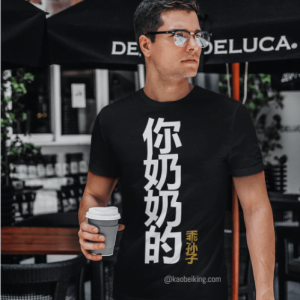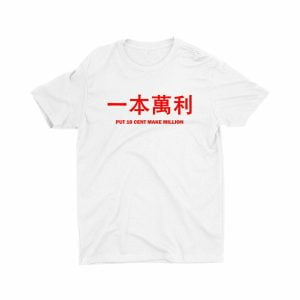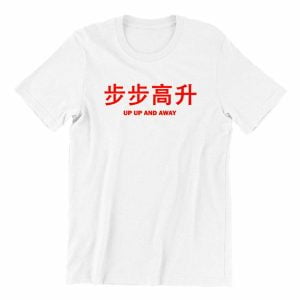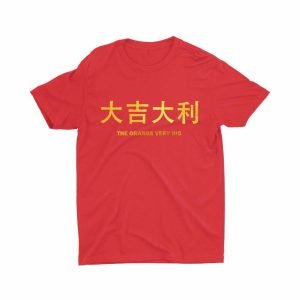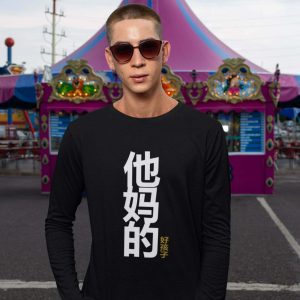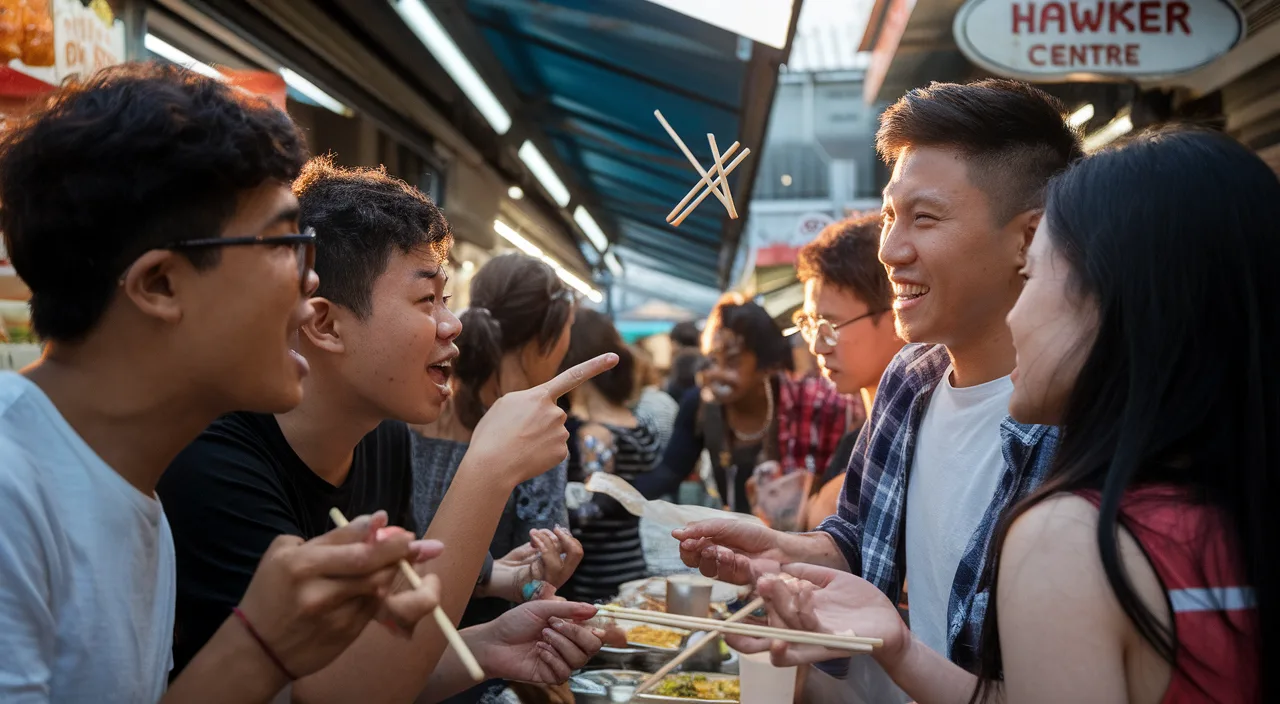What Does ‘Jump Queue’ Even Mean in Singapore?
Simple answer? It’s when someone tries to cut into a line, whether at the hawker stall, the MRT, or even, erh, metaphorically in life. But as any seasoned Singaporean will tell you — the real twist? ‘Jump queue’ has transcended the physical act and become a fiery accusation in any argument when someone is seen as getting unfair advantage. It’s sarcasm. It’s shade. It’s Singaporean-style conflict resolution — all in 2 words.
-
Chinese, KaoBeiKing, Quote, T-shirts, Typography
Price range: $30.00 through $38.00 Select options This product has multiple variants. The options may be chosen on the product page
- Straight to the point: ‘Jump queue’ is a Singlish phrase used literally AND metaphorically to settle arguments.
- Great for disputes: Accusing someone of ‘jump queue’ instantly brings the discussion to a halt with laughter (or embarrassment).
- Conflict resolver: Use it right and it can resolve conflict with humour and cheekiness while ending disagreements.
- Culturally on point: The phrase captures our local values – from fairness to food queuing etiquette.
The Significance of ‘Jump Queue’ in Singaporean Culture
Picture this ah: You’re at Maxwell Food Centre. You see two stalls — one got a queue so long, you can go Johor and come back… the other one is completely empty. You know what means — queue equals good food. So, what happens if someone strolls up and plonks themselves right in front? Wah, instant drama. That’s the literal meaning of ‘jump queue’, and if you’ve experienced it, you know how kenna furious it makes you.
But here’s where Singaporeans are architect level clever — over time, ‘jump queue’ started appearing in complaints that had nothing to do with queues. Friend got promoted? Someone say, “Wah, he jump queue sia!” Cousin got married before the older sibling? “Why she jump queue one?”
This evolution is very Singaporean — we took a mundane, kiasu-induced phenomenon and turned it into a meme-worthy, argument-ending punchline. It’s basically our version of a verbal mic drop that helps resolve conflict in typical local fashion.
How to Use ‘Jump Queue’ to Settle Disagreements
-
Children, Chinese, Chinese New Year, KaoBeiKing, Quote, Singlish/Hokkien, Typography
$25.00 Select options This product has multiple variants. The options may be chosen on the product page -
Chinese, Chinese New Year, Ladies, Mens, T-shirts
Price range: $30.00 through $38.00 Select options This product has multiple variants. The options may be chosen on the product page
We all have that one friend lah — always drama, always want to win every argument. But next time someone tries to play the moral high ground, just say they ‘jump queue’. Boom. Situation diffused. You win liao lor.
Here’s a few classic scenarios where ‘jump queue’ is your tap-out card to settle arguments and end disagreements:
1. Group Outings — Who Decides Where to Eat?
“Eh, why suddenly we eating there? I thought we say Korean last week?” “Eh bro jump queue lah, strong opinion.”
Case closed. Move on.
2. Work Meetings — Who Took Credit?
“Just now the idea actually mine hor, but boss say your name. You jump queue is it?”
Subtle call-out, tension defused, everyone chuckle, ego bruise slightly but no explosion. Perfect way to resolve conflict.
3. Family Drama — Wedding Before the Eldest
“Huh, the younger daughter marry first ah? Wah, that one jump queue leh.”
Either everyone laughs… or grandma gets involved. Use with caution.
-
Children, Chinese, Chinese New Year, Quote, Typography
$30.00 Select options This product has multiple variants. The options may be chosen on the product page -
Chinese, KaoBeiKing, Long Sleeve, Quote, Typography
$38.00 Select options This product has multiple variants. The options may be chosen on the product page
The phrase works so well because it’s cheeky and layered. It hints at injustice without full-on confrontation. It says, “You low-key wrong, but I still love you lah.” And that, my friends, is the Singaporean way to settle arguments. No need for shouting. Just a bit of stinging humour.
Examples of ‘Jump Queue’ in Action
Let’s be real. Knowing about something and actually using it to settle arguments? Two different things right? So let me give you some ah-then moments where ‘jump queue’ totally saves face and helps resolve conflict.
- Couple Fight:
“You promise we watch that K-drama together but you finish without me?? You jump queue?!?” - At NTUC FairPrice:
Auntie push her trolley in front of you. You (with dagger eyes): “Auntie, cannot jump queue hor.” - Project Team Drama:
“Why he kena the presentation? You all never see the effort I put in meh? Jump queue again…” - Generic Dispute:
“Walao, can someone call out how she always gets things first ah? Serious case of jump queue syndrome.”
And here’s the best part — nobody knows if you’re joking or not. That’s the power move when you want to end disagreements. Mystery. Shade. All in one.
Incorporating ‘Jump Queue’ into Everyday Conversations
So you want to drop the phrase like a pro to settle arguments? No probs. Here’s a breakdown.
Use It as a Gentle Roast
Your colleague always goes to lunch 5 mins before break? “Wah, everyday jump queue.” Everyone will laugh, colleague will pretend to laugh also, but might come late tomorrow. Success in conflict resolution.
Throw It into Online Chats
Group chat playing mobile game: “eh why you get the rare loot, jump queue right…” Magic way to resolve conflict online.
Make It a Response to Complaints
Friend complains they didn’t get spotlight. Just say: “Next time don’t jump queue lor.” Flex plus life lesson equals vibes. Perfect to end disagreements.
Feel the Flow — Use Singlish Rhythm
When paired with Singlish cadence, ‘jump queue’ sounds like poetry:
“You ah… always jump queue leh.” vs “I think you unfairly got ahead.”
One sounds like complaint. One sounds like comedy gold that can settle arguments. You decide.
Conclusion: Why ‘Jump Queue’ Is the Ultimate Solution for Singaporean Disputes
Every culture got their way of saying “eh, not fair ah”—but in Singapore, it comes served with kopi, sarcasm, and enough local flavour to make your ah ma proud. ‘Jump queue’ may sound trivial, but don’t play play—it helps end disagreements, settle arguments, and even resolve conflict without creating drama.
It’s a true-blue Singaporean language twist: one expression, many uses, and legit emotional healing power. Whether you use it to call out behaviour, tease someone, or just roast your group chat kakis, it brings us all closer in laughter — and maybe a little shame.
So the next time you want to settle an argument or resolve conflict? Just ask: “You jump queue ah?”
Frequently Asked Questions
Can ‘jump queue’ be used outside Singapore?
You can, but people may take it literally. Only Singaporeans fully understand and appreciate the sarcastic undertones that help resolve conflict.
Is ‘jump queue’ considered rude?
Not necessarily — depends on tone. In joking contexts, it’s humorous and can settle arguments. But used in anger? Can become confrontation.
Is this an actual Singlish phrase?
Yes! It’s a colloquial expression unique to Singaporean and perhaps Malaysian English usage, perfect for ending disagreements.
Can I use ‘jump queue’ at work?
For sure — just keep it light-hearted. Works best in casual chats or when scoring points during meetings to resolve conflict peacefully.
What’s the best way to explain it to tourists?
Tell them it originally meant cutting a line. Then explain it also means calling someone out when they get ahead unfairly — Singaporean joke style that helps settle arguments.
Is there a female/male version?
Nope. ‘Jump queue’ is universal. Everyone can kena or use it to resolve conflict, no discrimination here!


